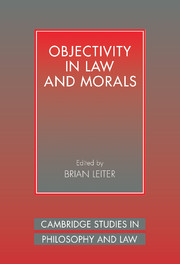Book contents
- Frontmatter
- Contents
- Contributors
- Acknowledgments
- Introduction
- 1 Legal Interpretation, Objectivity, and Morality
- 2 Objectivity, Morality, and Adjudication
- 3 Objectivity Fit for Law
- 4 Objective Values: Does Metaethics Rest on a Mistake?
- 5 Notes on Value and Objectivity
- 6 Embracing Objectivity in Ethics
- 7 Pathetic Ethics
- Bibliography
- Index
Introduction
Published online by Cambridge University Press: 06 October 2009
- Frontmatter
- Contents
- Contributors
- Acknowledgments
- Introduction
- 1 Legal Interpretation, Objectivity, and Morality
- 2 Objectivity, Morality, and Adjudication
- 3 Objectivity Fit for Law
- 4 Objective Values: Does Metaethics Rest on a Mistake?
- 5 Notes on Value and Objectivity
- 6 Embracing Objectivity in Ethics
- 7 Pathetic Ethics
- Bibliography
- Index
Summary
Ordinary language and thought are replete with claims to objectivity. “Abortion is objectively wrong, no matter what some people think.” “Creationism is objectively false; evolution is just an objective fact.” “Research on sex differences is rarely objective; it reflects the male-dominance of the field.” “You're not being objective when you let your strong dislike of him affect your evaluation of his performance.” “Calm down and try to be objective about the situation.” “Supreme Court justices aren't any more objective than any other partisan political actors.”
What is at stake in these claims about objectivity? This introduction sets out one conventional philosophical way of understanding these claims, in which we read them as raising issues in metaphysics and epistemeology. So understood, we can distinguish two kinds of worries about objectivity implicit in ordinary language and thought. In some of the above examples, the demand to be objective is the demand to be free of bias or other factors that distort judgment, that prevent the things we are judging from presenting themselves clearly and accurately. This, then, is a demand for epistemic objectivity: that the cognitive processes and mechanisms by which we form beliefs about the world be constituted in such a way that they at least tend toward the production of accurate representations of how things are.
- Type
- Chapter
- Information
- Objectivity in Law and Morals , pp. 1 - 11Publisher: Cambridge University PressPrint publication year: 2000



